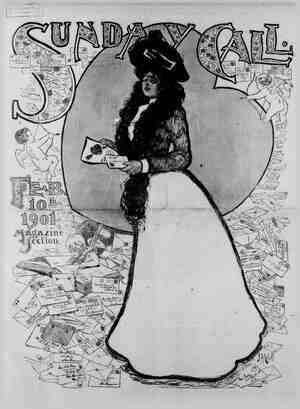The San Francisco Call. Newspaper, February 10, 1901, Page 12
You have reached the hourly page view limit. Unlock higher limit to our entire archive!
Subscribers enjoy higher page view limit, downloads, and exclusive features.
THE SUNDAY CALL. ns 5o he and his playwriter, Rostand, itinent a-buzz with their new pro- The fame of it reached to our s 2d an ector of ours gave us the in a form 80 good that we were all o i Biglon end @oquelin the more greedy for Coquelin’s rendering. ‘When he brought it to Am 80 dazzled by it that we fc fleld, who helpe his part’s cre; a'we werg 'got poor M: ! pave the way for Coquelin and Rostand together en-us something new in art,” we have shid. And Coquelin is sixty years old. hedernbeidt Goquelin Serel fmerien Gou Here 18 the great Bernhardt born in 1844 —that makes her fifty-seven come the 22d of October next. season she years old, Only last produced the same author's new tragedy and set the Seine afire with her playing of it. More than that, world fe is wrapping Itself L’Alglon It is corseting ftself to L’Aiglor: figure. It 1s shingling itself t» L’Aiglon hair-cut. The gods can grant na more. tha Henry Fouguier wrote a sad good-by to her when she left France ior her Ameri- can tour, by which we are the richer. His parting tribute to her was .renchy its eloquence, universal in its adoration Bald he: “We may say, indeed, that ail forms of human realjty or dream have is- sued from her lips or been evoked In her attitudes.” Everybody knows by this time how in this tragedy she plays the part of a_boy— the sad little Duke of Reichstadt. She plays it with a strength which, if the orig- inal Duke had possessed it, a critic says, might have won for him gre.ter thin than did his frail little hopes in real life. Whether: true to the life or not, at any. rate it is a great tragic creation that marks a new epoch in the career of its actress. , To Coquelin in the part of Cyrano no greater tribute can be paid than that of its author. The printed French edition of the play contains on its first page the fol- lowing dedication: “It is to Cyrano's spirit that I wished to dedicate this poem, But since that spirit has passed Into vou, Coquelin, it is to you that I inscribe this dedication. E. R." Adolph Aderer gives an account of the triumph of the plece in Paris. He says: ved during the whole h we may r well call ith perform- which was a on March able fete d After the first act flower-girls carried ba 't little bouquets in all parts theater, and every spectator was able to select his fa- vorite Ragu arour a round plece was n but was reviv ued its tri the year, wh first performan [ has wr ¢ is admfr. able I cannot too e eat it. He is the soul of 2 marvel- ous com always age and warming around him by his life and sp The wonderful actors must share hone o with thelr AYW t imond Ros- tand, dramatic poet, car hi as a fin ¢ siecle w tury he powers. Born only thirty-three years ago, he has already be of a new er what luck, last to be 1 as come his art 2 writer. the too minute } 1 the express drama. - We perceive the s sun of anclent Gaul, which, 2 ng eclipse, rises once m Think 1897, when the new his twenties! It was three ye that the Come of that from rs bef Francai “Romagesques.” Its suc that Bernhardegimm to write her a play arrangement was and the modera lowed by a Rostand come, however stead of his was to Hel nounced him If fate seem squared herse! this was fol- in “Samaritaine.” s still to o success of imph w new dramatist. d a bit unfair in this, she son by letting him produce “L’Aiglen” for the divine Sarah's portrayal. It proved as tremendous a trag- edy as “Cyrano” had been comedy, and its popularity was as far-reaching. Hero again on side the Water has a Ros- tand play been taken up and attempted by an amb The pub! to Richa talking; art is art, and it what these two plays res Bernhart and C 1uelin she A little girl and her 2 walk out on Union stre and as they walked the skirt on the sharp ed and tore off several s f lace. “Won't you tear it off for me, she asked. “I cannot mend t now.™ The accommeodating little girl dropped on her knee, and for several minutes there was the sound of tearing goods—really much more tearing than was necessary to remove a piece of lace only half an inch wide. ° it went for & the other day, aunt caught her of her shoe heel dear?* “Haven't you finished yet?" finally asked the aunt. “Yes." said the littlqgirl, rising wearily, *} was taking all chis off. I wanted enough for my doll's skirt while I was at it, and the little plece you tore of wouldn’t do.”—Memphis Scimetar. 2
